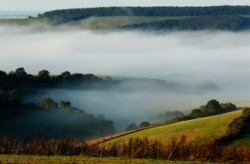Italian author Giovanni Boccaccio's classic book “The Decameron,” completed by the author shortly after the 14th century Black Death, seven young women and three young men escape the bubonic plague and seclude themselves in a countryside villa outside Florence.
There they narrate a hundred tales to occupy their self-quarantine.
The book concludes with the group returning happily to the city of Florence on the passing of the plague, to resume their previous pre-contagion lives. Today, many affluent city dwellers in Britain and elsewhere in Europe appear determined to head in the opposite direction in the coronavirus era, with four out of 10 city-based house-hunters seriously considering an escape to the countryside for good, according to a recent survey.
For many it is a relocation they hadn’t thought of prior to the pandemic, but having grown accustomed to working from home during the lockdown, and skeptical that city life will return to anything like the pre-pandemic “normal” in the foreseeable future, they see advantages in embracing a rural life.
Real estate agents say they’re fielding a surge of inquiries from city-dwellers wanting to relocate. “They now realize they can work from home very happily,” says Jamie Jamieson, a property-search specialist in the eastern English counties of Norfolk and Suffolk. He says inquiries have increased by 60 percent from urbanites wanting his help with a house search. Prior to the pandemic there used to be a lag between talking with a potential client and them signing on for his assistance. Now they’re much more motivated. “There is no lag at all,” he told VOA.
Jamieson is not alone among Britain’s real estate agents and property search companies seeing a surge of interest in moving away from London and the big cities. Property is more affordable and for the price of an apartment in parts of the British capital, buyers can secure a substantial six-bedroom house in Norfolk. “They can get more space, a garden, more light and go for walks in the evening along the seashore rather than having a difficult commute on the underground in the evening,” says Jamieson.
Lucian Cook of Savills, one of Britain’s biggest real estate agencies, is seeing a similar increase. His company conducted a survey last month of buyers and sellers across Britain who had registered with Savills. Thirty percent of the Londoners questioned said they are more likely to consider a village or rural location now for their next house purchase, “a reflection,” he says, “of a change in thinking about work-life balance.”
Cook says he noticed a lot of “window-shopping” on Savills’ website as the nine-week coronavirus lockdown unfolded with a jump in online browsing of listed country properties. And the company has experienced an increase in registrations by prospective buyers of country houses. Cook predicts a “rural renaissance” — one of the potential outcomes of the pandemic. He says buyers feel “something has broken” in the cities and “don’t expect city life will recover for some time,” he told VOA.
Ryan Jager, a freelance journalist and father of a newborn, says he and his wife are drawn to the idea of rural living. “Smaller class sizes for when my little boy starts school, slower way of life, larger property, fresher air - just some of the reasons,” he says.
The wave of interest in relocating to rural areas is being noted by agents in other western and southern European countries, too, prompting talk about a revival of semi-abandoned and struggling villages.
In France, Britain-born Parisian Mitch Hooper, a theater director, has been seeing out the pandemic with his girlfriend in the country “among the birds and the flowers rather than concrete and cars and COVID and I am now in no great hurry to return.” Hooper says he is “thinking about” a longer-term move away from the city. “I would still keep my Paris apartment and work from there, when and if necessary,” he adds.
“Hamlets are the future of Italy as coronavirus shows the classic office job in the big city is the past,” Anna Laura Orrico, the Italian culture minister, said recently.
Stefano Boeri, a renowned Italian architect and urban planner, says the shift from cities to villages should be encouraged by governments with financial incentives. He notes Italy has 5,800 villages with fewer than 5,000 residents with nearly half virtually abandoned. Italians have decamped from the cities before — notably in the 1970s and 1980s, the “Years of Lead,” as they were known, when the country was engulfed in political and social turmoil and buffeted by domestic terrorism launched by extremists on the right and left of the political spectrum.
“Young people fled cities beset by terrorism, the economic crisis and drugs. It'll happen again,” Massimiliano Fuksashe, an Italian architect, told Italian newspaper Ia Repubblica. “Scientists say the virus is weaker in the countryside, not just because there are fewer social contacts but because the wind blows, there’s less metal and plastic, and if you’re close to the sea the air is full of iodine,” he added.
Is this all a flash in the pan, though, or the start of an enduring trend? The rural retreat during the “Years of Lead” reversed, some note. Many rural areas in some south European states have poor internet connections, making remote working impossible or challenging. Italy has only 13 percent broadband links across the country and many in villages either have no internet access or poor connections via unreliable line-of-sight towers or slow speed copper phone lines.
Jobs are also in short supply in many rural areas. There were predictions in Italy after the 2008 financial crash of an exodus to the villages. Some youngsters did make the move, finding life cheaper in the countryside. But the full prediction of an escape to the country wasn’t fulfilled.
This time may be different, though, says the Norfolk real estate specialist Jamieson. Companies may welcome their employees relocating, he says. “A company owner I spoke to yesterday, and who employs about 200 people, has four office buildings in London. They have all now agreed they will work in London for two days of the week in just one of the buildings and work from home the rest of the time,” he says. Having fewer office buildings will reduce costs by about $2.5 million a year.
Cook, the head of research at Savills, agrees that a change in work practices by companies, and the realization by owners that they can make substantial savings by not owning or leasing large offices, may also fuel an escape to the country. But he notes easy transportation links to major cities or thriving towns, as well as high-quality broadband, will favor some rural areas over others.
In the United States, real estate agents say they are also seeing a jump in inquiries from city dwellers. “I have had numerous calls from people in Washington, DC,” says Dan Anderson, an agent with Greentree Realty in West Virginia’s Shepherdstown, a historic college town around 90 minutes’ drive from the U.S. capital and set in rolling countryside. “I think I will get more,” he said. “It will be interesting to see if this is a reflex to the pandemic or something more enduring. I suppose in about six months’ time, we will know for sure,” he adds.







